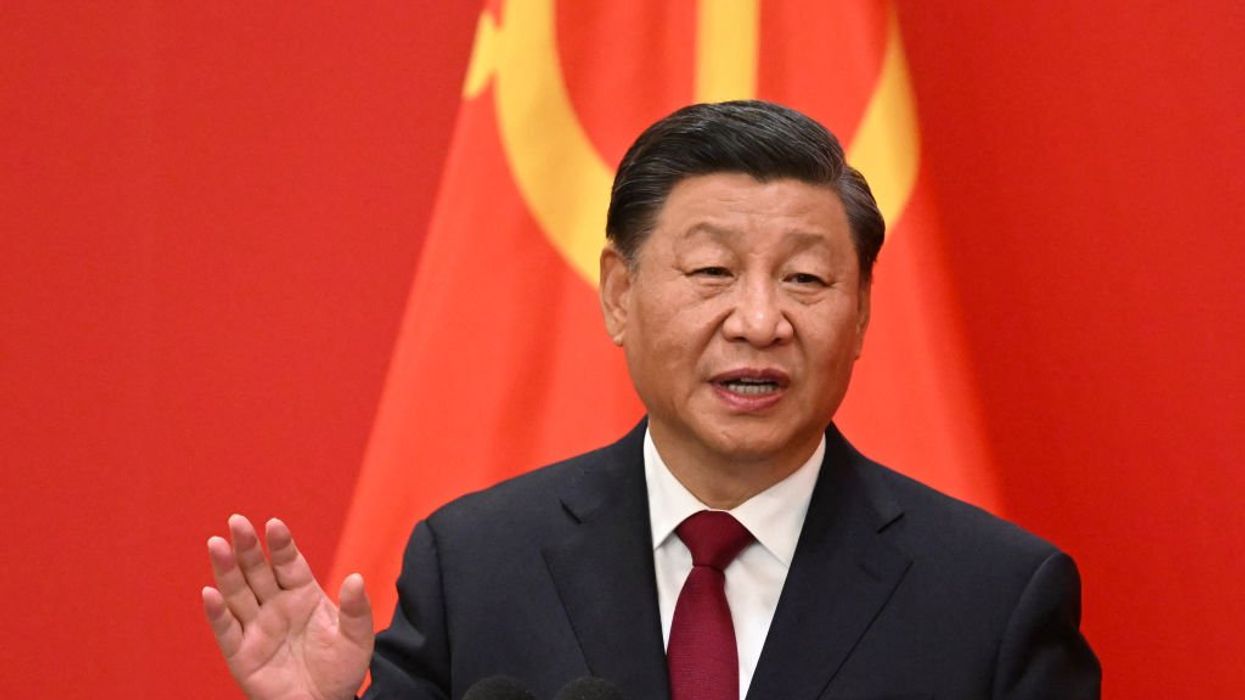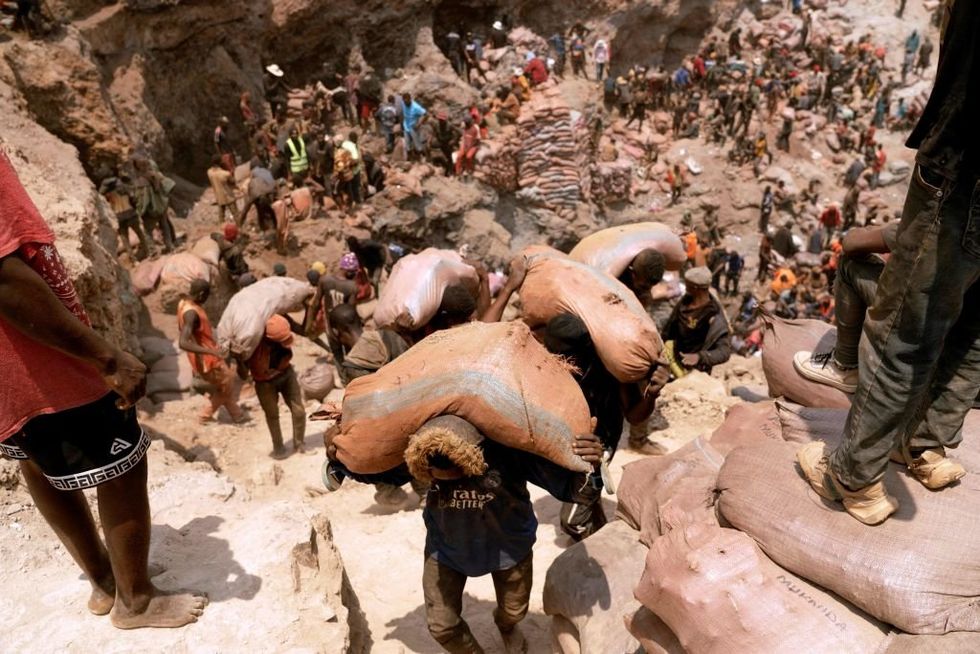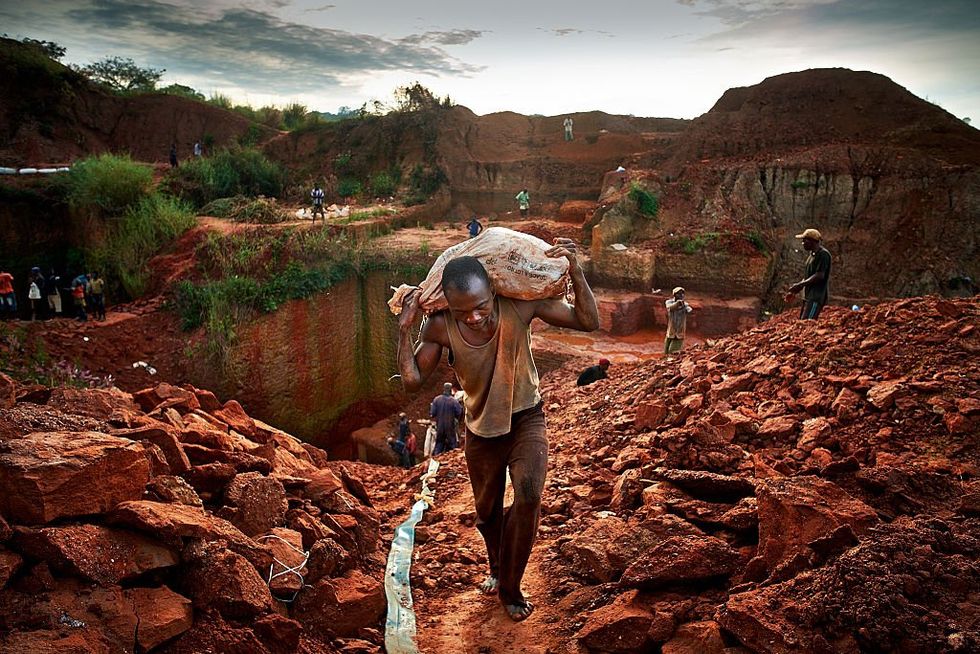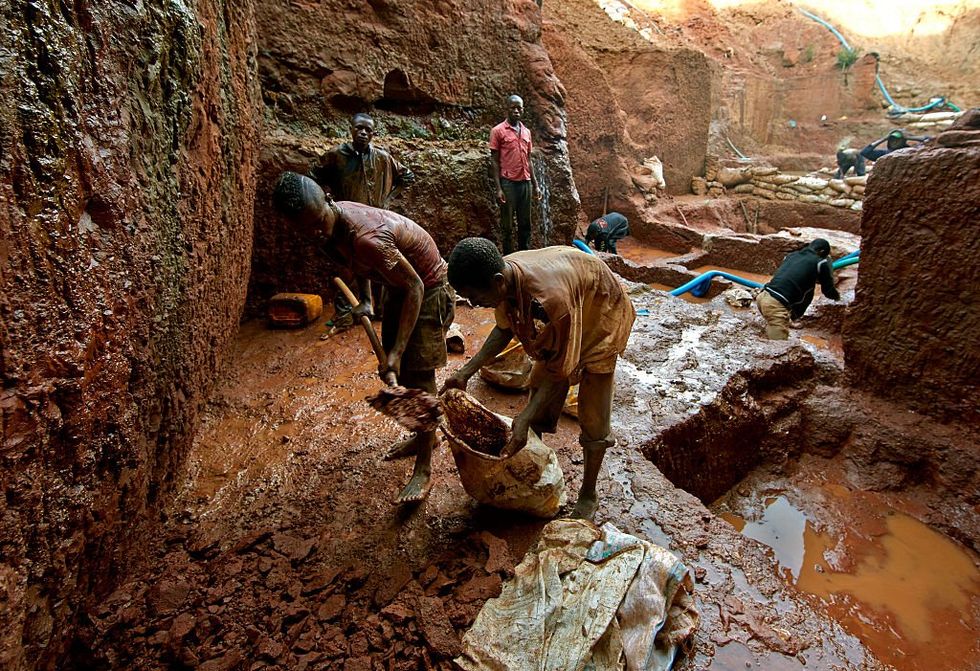
NOEL CELIS/Getty

In 2023, the Biden administration announced a plan for new EPA regulations requiring 67% of all new light vehicle sales in the U.S. to be EVs.
“By proposing the most ambitious pollution standards ever for cars and trucks, we are delivering on the Biden-Harris Administration’s promise to protect people and the planet, securing critical reductions in dangerous air and climate pollution and ensuring significant economic benefits like lower fuel and maintenance costs for families,” said EPA administrator Michael S. Regan.
There are a few small problems: This is a goal requiring trillions of dollars of investment, reliance on Chinese batteries, and dramatically increased energy costs. But the thorny problem of reality has never gotten in the way of grand U.S. government pronouncements. To understand why this is an unserious target, you must dig into the supply chain for the components that make the batteries powering modern civilization. It’s a world filled with some of the shadiest people on earth, from African warlords to Israeli diamond brokers, slave labor, commodities traders, and Chinese mining magnates.
In many ways, EVs perfectly encapsulate the arguments around climate change. People pick a side and begin yelling. Many reasonable people agree that a future with clean, renewable energy is an admirable goal. The problem lost in these discussions is the pragmatism of accomplishing that. It’s easy to say we must all drive EVs; it’s a lot harder when the batteries and infrastructure don’t exist.
Many fail to grasp that this is fundamentally a political question, not a scientific problem. When you’re discussing radically transforming entire industries, laying off tens of thousands of people, and changing the grid, your constituents are bound to ask questions. And when China and India appear to have no intention to reduce their emissions, it further complicates whether we should kneecap our entire energy sector.
Assuming, as many now do, that anthropogenic climate change is significant — and significantly driven by China — the persistent question is how Americans can counter its deleterious effects in a way that strengthens us without leaving the American energy grid more vulnerable and our industry less competitive. And if the Chinese already control the supply of materials and production for the batteries, what political compromises will we have to make to go electric?

It’s important to understand that as more products use batteries, control of the raw components used to manufacture these items will be a crucial pain point of geopolitical power. In "Volt Rush: The Winners and Losers in the Race to Go Green," author Henry Sanderson outlines how China anticipated the future demand for batteries and moved to buy up the mines necessary in the supply chain. According to Sanderson, China has positioned itself to be the global supplier of batteries.
Additionally, China has aggressively acquired a lithium supply and now owns nearly 65% of the refining capacity. Lithium-ion batteries are the most popular choice for electric vehicles due to their high energy density, long cycle life, and low self-discharge. Lithium is a critical element in the production of electric vehicle batteries, and its demand is expected to continue growing as the adoption of electric vehicles increases.
Tesla recognized it was in danger of being frozen out of the Chinese supply chain and moved quickly to open plants in China to ensure it would have access to the batteries that would power its cars. The criticism of Tesla doing business in the People’s Republic ignores the reality: Without the Chinese batteries, there would be no Teslas on the road.
Although less critical for EVs, rare earth minerals are essential for manufacturing most pieces of technology, including smartphones and computers. China has emerged as the dominant player in the global rare earth minerals market, controlling around 80% of the world's supply.
China's dominance in the rare earth market relies on several factors.
China's control over the global rare earth minerals market has been consolidated through strategic investments. For instance, the China Nonferrous Metal Mining Group has financed projects in Myanmar, Vietnam, and the Democratic Republic of Congo. These investments have allowed China to secure a steady supply of rare earth minerals and influence the global market.
The best way to understand this new reality is to read up on China’s activities in the Democratic Republic of the Congo. The Congo's horrific history of violence and exploitation is exemplified by King Leopold II of Belgium’s creation of the Congo Free State in 1885. This was a modern slave empire where families who didn’t produce enough rubber and other resources had their limbs removed as punishment. Between 5 and 10 million people were killed during the colonial exploitation of the region. Writers and journalists, including Joseph Conrad and Edmund Dene Morel, exposed this horror machine and helped shut it down in 1908 via international pressure.
Unfortunately, this was not the end of the suffering for the Congo. The country is the paradigm of the "resource curse theory," whereby countries with abundant natural resources often face subjugation and stunted development. Following the assassination of Patrice Lumumba in 1961, facilitated by the CIA, there has been a line of petty dictators happy to trade natural resources for hard currency. China is only the latest foreign power that has discovered it can control the region's resources.
China's involvement in the Congolese mining sector started in the early 2000s and has proliferated. A lack of transparency and concerns regarding corruption, illicit financial flows, and the mismanagement of mining revenues have characterized China's investment in mining. China is happy to exploit vulnerable third world countries to secure its supply of the batteries of the future.
Chinese mining in the Congo has consequential implications for the global economy. For instance, the DRC is the world's largest producer of cobalt, a critical component in EV batteries and other high-tech applications. China's access to these resources enables it to maintain its dominance in industries such as EV manufacturing, consumer electronics, and renewable energy.

There is no escaping the fact that the products we consume in the modern world are tied to the exploitation of developing countries. Better not to ask who made your phone. These are the moral compromises one makes to enjoy the level of wealth even lower-class people in the Western world have grown accustomed to. Writers like Thomas Sowell advocate the libertarian argument that these low-paying jobs lift poor countries out of poverty. However, it’s unclear whether this argument rings true in the Congo. The wealth creation, for the most part, is likely to end up in Beijing and Zurich rather than Kinshasa.
Chinese mining operations in the DRC have been criticized for exploiting local workers by subjecting them to low wages, long working hours, and unsafe working conditions. This abuse has led to accidents and even fatalities, exacerbating poverty and social inequality in the country. And let’s be clear – this exploitation goes far beyond even sweatshop conditions and, by any reasonable modern definition, should be considered forced labor or slavery.
What has become a pillar of cobalt supply is something called artisanal mining. Unfortunately, despite its Whole Foods-esque name, it is an incredibly horrific practice in which people with no options must dig by hand to extract the cobalt we use in our batteries.
Sadly, keeping this artisanal cobalt out of the supply chain is nearly impossible, and China has no incentive to stop it. In his brilliant book "Cobalt Red: How the Blood of the Congo Powers Our Lives," Siddharth Kara explores the conditions on the ground for these miners. He also has a great segment on "The Joe Rogan Experience" explaining the industry's operation.
“Chinese mining companies took control of almost all the big mines, and the local population has been displaced and is under duress, and they dig in absolutely subhuman, gut-wrenching conditions for a dollar a day, feeding cobalt up the supply chain into all the phones, all the tablets, and especially electric cars,” Kara explains.
The Disturbing Reality of Cobalt Mining for Rechargeable Batteries youtu.be
Myopia around how these materials are mined is incredible for an environmental movement that prides itself on sustainability and green products. The extraction and processing of rare earth minerals are associated with severe environmental impacts, such as water pollution, soil contamination, and air pollution. China's lax ecological regulations have allowed it to produce rare earth minerals at a lower cost but at the expense of the environment.
For instance, the city of Baotou in Inner Mongolia, a central hub for China's rare earth minerals industry, has been plagued by severe pollution problems. The toxic waste generated by the extraction and processing of rare earth minerals has contaminated the surrounding soil and water with what has been described as a "toxic sludge."
Meanwhile, the mining activities of Chinese companies in the DRC have been associated with horrific environmental and social impacts, such as deforestation, water pollution, and forced displacement of local communities. Entire villages are relocated at gunpoint to make way for new mines, often without compensation.
Large-scale mining operations often require the clearing of vast areas of forests, leading to significant deforestation and the loss of habitats for various plant and animal species, reducing biodiversity, disrupting ecosystems, and increasing greenhouse gas emissions. In the Congo, these mining activities generate significant waste and chemical byproducts, such as tailings and acid mine drainage, contaminating local water sources.
China's control over the rare earth minerals market has significant geopolitical implications. As countries increasingly rely on rare earth minerals for their economic and military needs, the strategic importance of these minerals has grown. This trend has led to concerns about the potential for China to use its control over the rare earth minerals market as a geopolitical tool, either by cutting off supplies to rival countries or using its influence over the market to secure favorable trade deals and political concessions.
For instance, during the 2010 dispute between China and Japan over the Senkaku/Diaoyu Islands, China reportedly halted the export of rare earth minerals to Japan, causing a temporary disruption in the Japanese supply chain. This incident highlighted the vulnerability of countries heavily reliant on China for their rare earth mineral supplies and the potential for China to use its dominance as a geopolitical lever.
Chinese companies now control a significant share of the Congolese mining sector. For instance, China Molybdenum acquired the Tenke Fungurume mine, one of the largest copper and cobalt mines in the DRC, in 2016. Similarly, the China Nonferrous Metal Mining Group has invested in several mining projects in the country, such as the Deziwa copper and cobalt mine and the Lualaba copper smelter.
We’re already seeing China flex its muscle when it banned exports of rare earth magnets and the materials used to create them this year. The Chinese recognize that they control the global supply of these products and are prepared to use that leverage. Meanwhile, the West seems blissfully unaware this is even an issue.

Even with the moral qualms around the horrific environmental and human degradation in the Congo and the danger of a Chinese-controlled battery market, there simply is not enough infrastructure to allow a shift to EVs envisioned by U.S. bureaucrats in the next decade.
While the number of charging stations has grown, the current network is insufficient to support a full-scale transition to EVs. Public charging stations are sparse or nonexistent in many areas, especially rural and less populated regions. To support every new car becoming an EV, the U.S. would need a 10x increase in the number of charging points.
The electric grid in the United States is aging and often struggles to meet peak demand. The widespread adoption of EVs would significantly increase electricity consumption, placing additional strain on the grid. To accommodate this surge in demand, the U.S. would need to invest in grid modernization, including upgrading transmission lines, incorporating more renewable energy sources, and improving energy storage.
The transition to EVs requires an exponential increase in the production and supply of critical components such as batteries and electric motors. However, the current global supply chain for these components is limited and cannot meet the increased demand if every new car in the U.S. were to be an EV.
In this video, Saagar Enjeti brilliantly lays out on his "Breaking Points" show how this is probably a pipe dream. It would take a multitrillion-dollar investment to achieve the infrastructure to convert the country to electric vehicles, while significantly driving up the price of electricity.
“It certainly would be better for the climate if we switch from gas-powered vehicles to electric vehicles, even if that power comes from natural gas. Any so-called transition to an electric future cannot be sustained on the current power grid. A shift of two-thirds of all cars to the grid would dramatically increase the price of power across the United States for average home appliances, let alone the car that you now have to charge.”
Biden's INSANE Requirement For Majority Electric Cars In 9 Years | Breaking Points youtu.be
It seems like every celebrity, corporation, and politician can’t stop talking about the moral and existential imperative of going green. However, as of the end of 2023, there is only one U.S. rare earth mine (partially owned by China, it should be pointed out) and zero refining operations. Because of environmental regulations, it’s unlikely more mines and refineries will come online in the next decade. This highlights the deeply unserious nature of the mandates to adopt electric vehicles, a move likely only to increase our reliance on China while driving energy costs up.
China has cornered the market for the production of batteries and is poised to have firm control over their production for the foreseeable future. A battery embargo would have effects similar to the OPEC oil embargo in the 1970s in terms of net economic impact. People seem happy to speak in vague green platitudes without understanding the infrastructure and energy requirements to move to fully electric. Unfortunately, reality has a way of puncturing these illusions. The Chinese recognized this and, instead of virtue-signaling, bought up all of the mines needed to power the future. It seems clear which strategy will likely prevail.
- YouTube youtu.be